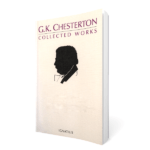Chesterton has often been dismissed for blindly idealizing the Middle Ages, but the real problem is quite the opposite. The modern world automatically attacks the Middle Ages as something backwards, dark, and superstitious, the enemy of reason and liberty. Chesterton merely defended the truth that reason and liberty enjoyed a high point in medieval times that the world has not really seen since. He acknowledged that there were still problems in those times, and there are certainly many things that we can rightfully regard as improvements. But history is not a story of progress. Our fortunes move both backward and forward. While technology provides a kind of liberty, it also provides a kind of slavery. While the experts are useful as servants, they are unbearable as masters.
In the Middle Ages the peasant class, according to Chesterton, was still successfully fighting off the rise of the Aristocratic state. He refers to a famous peasant uprising where they “killed the lawyers; a comprehensible and (relatively) even commendable course; though they also showed some disposition to hang anybody who could read or write; which is perhaps carrying the distrust of professionalism too far.”
The most difficult thing for us to understand about that culture is that it was purely Catholic, there were no Reformers or Rebels to contend with. The theology was solid and widespread. The criticisms of the Church came in the form of making fun of stuffy Roman officialism, or, in the case of Geoffrey Chaucer, making fun of friars.
Chesterton’s book on Chaucer is a lesson in history, theology, literature and art. It also a tribute from one great humorist to another. When Chesterton writes about writing, he is exquisite. He is letting us inside his craft. But great writing is nothing if it is not about something, and the writing that rises highest takes on the greatest subjects. Chesterton explains why Chaucer is transcendent: “The greatest poets of the world have a certain serenity, because they have not bothered to invent a small philosophy, but have rather inherited a large philosophy. It is, nine times out of ten, a philosophy which very great men share with very ordinary men.” (This also explains why Chesterton is transcendent.)
Chaucer’s masterpiece, The Canterbury Tales are like a cathedral built of words, huge in scope, minute in detail. The poem is perfectly constructed, if ultimately unfinished. To read it is to join on the pilgrimage being described, the journey to a holy place, to partake in both the hard work and all the amusing, even painfully funny, events that help us get there. But as I say, it is unfinished. And there is something unfinished about Chesterton’s masterpiece as well. When I say Chesterton’s masterpiece, I refer to the entire body of his work, which lacks the book on Shakespeare that he never wrote. We get a glimpse of what that book would have been here as he compares Chaucer and Shakespeare. He addresses those who have a hard time with Chaucer’s Middle English by reminding them that some people even need Shakespeare to be translated.
In spite of the stops and starts, we do arrive at the Cathedral, a place of prayer, of peace, even though it also a place of bloodshed. The poetry, the historical events, the permanent pieces of our culture all point to a gigantic truth that in the end defies all the words we give it. It simply brings us to our knees.
There is at the back of all our lives an abyss of light, more blinding and unfathomable than any abyss of darkness; and it is the abyss of actuality, of existence, of the fact that things truly are, and that we ourselves are incredibly and sometimes almost incredulously real. It is the fundamental fact of being, as against not being; it is unthinkable, yet we cannot unthink it, though we may sometimes be unthinking about it; unthinking and especially unthanking. For he who has realized this reality knows that it does outweigh, literally to infinity, all lesser regrets or arguments for negation, and that under all our rumblings there is a subconscious substance of gratitude. That light of the positive is the business of the poets, because they see all things in the light of it more than do other men.
Chaucer was a child of light and not merely of twilight, the mere red twilight of one passing dawn of revolution, or the grey twilight of one dying day of social decline. He was the immediate heir of something like what Catholics call the Primitive Revelation; that glimpse that was given of the world when God saw that it was good; and so long as the artist gives us glimpses of that, it matters nothing that they are fragmentary or even trivial; whether it be in the mere fact that a medieval Court poet could appreciate a daisy, or that he could write, in a sort of flash of blinding moonshine, of the lover who ‘slept no more than does the nightingale’. These things belong to the same world of wonder as the primary wonder at the very existence of the world; higher than any common pros and cons, or likes and dislikes, however legitimate. Creation was the greatest of all Revolutions. It was for that, as the ancient poet said, that the morning stars sang together; and the most modern poets, like the medieval poets, may descend very far from that height of realization and stray and stumble and seem distraught; but we shall know them for the Sons of God, when they are still shouting for joy. This is something much more mystical and absolute than any modern thing that is called optimism; for it is only rarely that we realize, like a vision of the heavens filled with a chorus of giants, the primeval duty of Praise.

